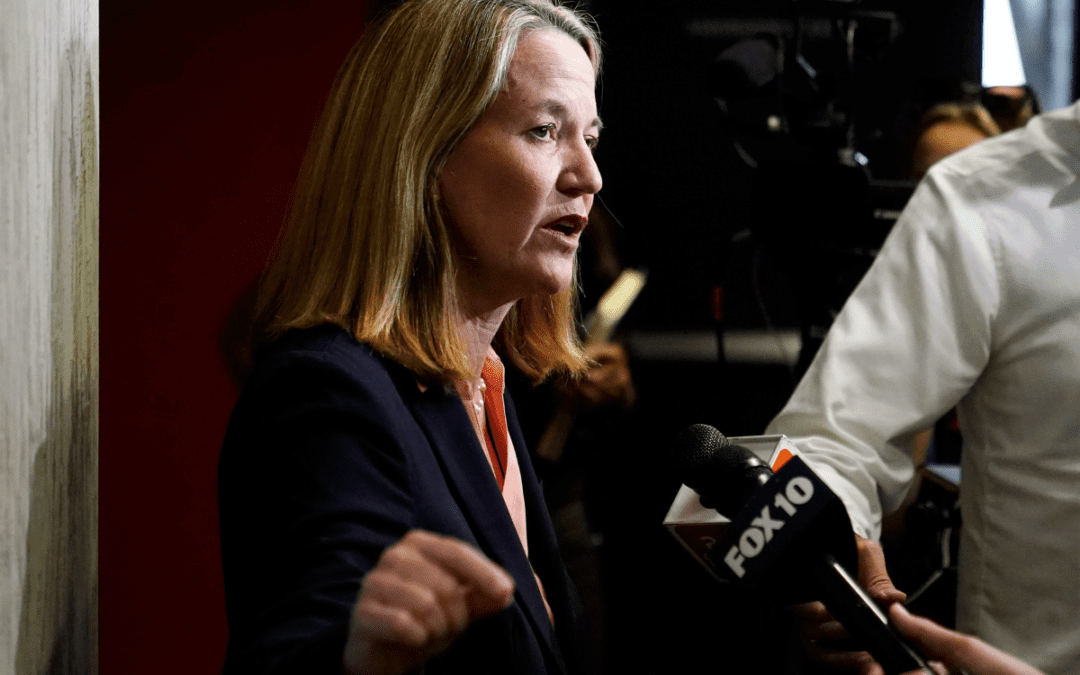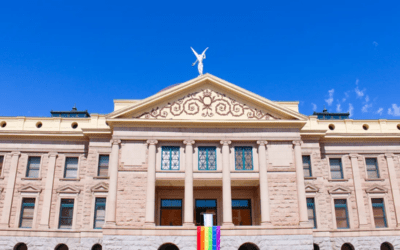Dr. Karma R. Chávez is an Arizona State University alumnus and author of the forthcoming book, Alienizing Nation: HIV/AIDS and the Rhetoric of Quarantine, Ban, and Resistance. She’s also the chair of the Department of Mexican American and Latina/o Studies at the University of Texas at Austin. She writes about immigration, queer politics, and social movements.
Commentators have recently been comparing HIV/AIDS and COVID-19 by noting the similarities between AIDS originally being known as “gay cancer” or GRID—gay-related immune deficiency—and Trump’s decision to refer to COVID-19 as the “Chinese virus.”
But an unremarked upon takeaway from the AIDS era is not just that a presumably contagious or communicable disease will be used as an opportunity to marginalize the marginalized. Instead, AIDS can remind us in the present moment that dangerous disease is always an opportunity to foment anti-immigrant and xenophobic sentiment.
As early as 1983, members of the religious right – like the late Reverend Jerry Falwell – made calls to quarantine people living with AIDS. It took little time for such calls to enter the mainstream, even as public health officials soon realized that AIDS (and later the virus that caused it, HIV) was not communicable by casual means.
That it was not communicable meant that widespread quarantine would not be an effective measure to prevent its spread. Still, several states created new quarantine statutes or rewrote old ones to address the AIDS pandemic.
Most of those statutes focused on dealing with “incorrigible” individuals, usually prostitutes, drug users, and gay men—mostly black and of color, or those confined to institutions such as prisons or military barracks.
Two times in the mid-1980s, voters in the state of California were asked to vote in a popular referendum to determine whether people living with AIDS in that state should be subject to quarantine.
By the latter 1980s, most public health officials agreed that quarantine was an inappropriate response, but the science did not stop elected officials such as Senator Jesse Helms of North Carolina or Representative William Dannemeyer of California from continuing to support and publicly advocate for the quarantine of people living with AIDS.
Even as the possibility for a mass quarantine of US citizens faded away, these politicians, along with members of the Reagan Administration—most notably, Acting Health and Human Services Secretary James O. Mason—quietly transferred this logic of quarantine from the US citizenry to immigrants.
In late 1985, Mason proposed a modification to US immigration law that would add AIDS to the list of “dangerous and contagious diseases” that could bar an immigrant in US immigration law. By the spring of 1987, on the heels of President Reagan’s first public mention of AIDS, this proposal moved through the governmental machinery and was on its way to being approved as a federal regulation.
In May of 1987, Senator Helms proposed an amendment during a debate over a supplemental appropriations bill that included a proposal to provide funds for poor people who’d benefited from participating in a trial of the AIDS drug AZT. It would allow these people to remain on the drug for free after trial, and would only agree to the funds release if immigration law was changed to add AIDS to the list of dangerous and contagious diseases for the purpose of immigration law.
Although an intense debate ensued, in the end, the proposal was approved in the Senate and became the law of the land. This law lasted until 2010.
The implications of this law were significant. Not only were HIV-positive people banned from migrating, but those who stood to benefit from the 1986 Immigration Reform and Control Act, which provided a pathway to regularization for millions of undocumented immigrants, would now have to be tested before their application could be approved. This sent an unknown number back to the shadows.
Moreover, the ban sent the message that immigrants were not to be trusted; they were always a threat to the health of the nation.
As President Trump has used COVID-19 as a rationale to close US borders to the movement of people, it is important to remember that he draws from a playbook that long preceded him.
People of Asian descent in the United States are currently reporting an uptick in hate crimes and bias incidents in this historical moment. It is also equally important to recall that disease has long been used as an opportunity to target those perceived as foreign for political ends.
Knowing these histories can help us to draw from lessons of the past to face the present. In this case, it is important to know that US AIDS activists in groups such as the AIDS Coalition to Unleash Power (ACT UP) built coalitions with their immigrant counterparts in order to fight the twin violences of homophobia and xenophobia.
Today, one of the greatest actions we can take is to support our local immigrant rights groups who are fighting for the rights of those detained, raging against xenophobic violence, and ensuring that COVID-19 doesn’t become yet another opportunity for Donald Trump to enact his draconian anti-immigrant and isolationist agenda.
AIDS activists in the 1980s and 90s rallied behind the slogan that AIDS Knows No Borders. The same is true for COVID-19. We’re all in this together.

BREAKING: AG Kris Mayes sues rental corporations for conspiratorial price-fixing
It looks like, legally speaking, rent really may be “too damn high.” Arizona Attorney General Kris Mayes announced Wednesday a lawsuit against nine...

Op-ed: Trump’s journey from hosting The Apprentice to being the biggest loser
Leading up to the 2016 election, Donald Trump crafted an image of himself as a successful businessman and a winner. But in reality, Trump has a long...

Kari Lake’s plan for the US Senate: ‘The end of democracy’
The world’s most far-right political leaders flocked to National Harbor, Maryland, last week for a conservative conference where attendants idolized...

Flight attendants picket at more than 30 airports in ‘unprecedented’ show of solidarity
Hundreds of flight attendants picketed at Phoenix Sky Harbor Airport last week, calling attention to stagnant wages with low purchasing power, poor...




